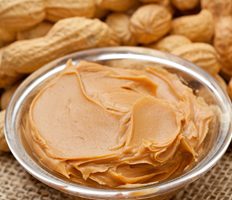
Food allergies are one of the scarier health conditions for parents to imagine confronting with their kids, and nut allergies are among some of the worst. Peanut allergies have been difficult to deal with, historically, as childhood favorites tend to be peanut butter and jelly sandwiches or crackers with the sticky spread. But more and more schools and institutions have begun outlawing the substance to help protect their kids.
In addition to combating the (sometimes fatal) allergy on the day-to-day front, allergists have been researching what might cause the body to react this way to such a seemingly harmless legume. According to a recent study from researchers in the U.K., peanut (and other food) allergies could be linked to a skin disorder and skin gene mutation.
"Researchers at King's College London and colleagues examined the amount of peanut protein to which 577 babies were exposed during their first year of life," according to WebMD. "This was done by measuring the amount of peanut protein in the dust collected by vacuum from the living room sofa in their home. The children were tested for peanut allergy years later when they were 8 and 11 years old. Their DNA was also checked for a specific skin barrier defect, known as an FLG mutation."
This mutation is also known to weaken the skin barrier, which scientists have long associated with making individuals more susceptible to allergic reactions.
The result of the study found that one in five children with a peanut allergy also had the gene mutation for FLG.
According to the study, which was published in the Journal of Allergy and Clinical Immunology, researchers found that babies who were exposed to three times the peanut protein in dust in the first 12 months of life were three times more at risk for a peanut allergy later in life than children who were not. Contrastingly, though, children who did not have the FLG mutation were unaffected regardless of the level of peanut dust in the home.
The researchers were excited by their findings because not only do they show that children with mutations may develop a peanut allergy via that same mutation, but it also shows how a person's response to their environment can be altered by their genes.
At present, approximately two percent of American children are allergic to peanuts. With this research, scientists hope that they may be able to reduce that number by limiting the exposure to peanut dust for kids that carry the FLG mutation.
This potential development for peanut allergies is truly exciting in the world of allergy relief. But the fact of the matter is that treatment is still many years out, and current allergy sufferers need to be sure that they are caring for themselves and their bodies as best they can. If you are interested in any allergy prevention products, visit Allergy Be Gone today!









